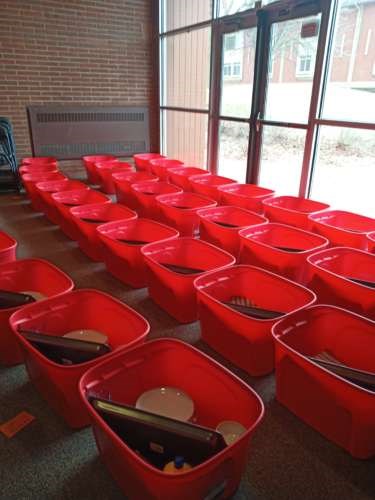A new working group at the University of Guelph is quickly responding to the surge in demand for students and their families amid the COVID-19 pandemic through food hamper delivery, electronic grocery cards and monetary donations.
The COVID-19 Food Security Working Group was formed in late March but has seen a surge in demand over the last few weeks.
“Like so many others, our students have suffered a significant loss of income and are finding it difficult to cover their basic costs of living,” said Carrie Chassels, vice-provost of student affairs in a statement. “We have set up this working group to develop longer term plans that will ensure food security for our students and for our local community during these times of uncertainty.”
The working group is made up of the university’s hospitality services, staff, alumni and the Guelph Student FoodBank.
Within one hour of opening, 130 students had registered with more than 90 dependents to receive hamper delivery or electronic grocery gift cards due to lost income and food insecurity.
Dena Van de Coevering is the president of the Central Student Association (CSA), of which the Guelph Student Foodbank (GSF) is a part. Prior to the pandemic, the GSF regularly supported approximately 200 students a week in accessing emergency food, anti-poverty resources and referrals. Now, its role within the working group is to oversee the online supply and delivery of electronic grocery cards to those in need.
“We had a strong inkling that there would be an uptake of resources during this time,” said Van De Coevering. “We're lucky that the university was able to dedicate funding from its Highest Priority Fund for the food bank to continue its initiatives of supporting students in need of food. Without that funding, we would not be able to be providing what we are.”
As of April 13, over 180 students had registered as recipients of the working group initiatives and the GSF has supported 59 families and 120 individuals through the first round of gift cards. There are at least 15 households currently on a waitlist for the next round, and Van de Coevering expects that number to grow.
“There are new visitors connecting with the FoodBank for support on an ongoing basis,” she said.
To limit physical contact, the GSF has closed its physical office and drastically reduced its volunteers while shifting its operations online. Individuals can now receive electronic grocery cards worth $75 to $100 and those with families can receive more. Some of those recipients include students who live in the city or on campus year-round.
Of the approximately 170 people living at the university, most are international students in residence and there are about 300 people in family housing.
In early April, the university’s hospitality services delivered 75 hampers to students in residence and made a donation of $32,000 worth of food to local food banks. The working group also meets regularly to discuss the best ways to support the student community. Van de Coevering says financial contributions from the greater community are key to the longevity of this initiative.
“If we're fortunate enough to continue to receive the financial donations that we have thus far, then we will be set up for a very successful situation in a very difficult time to be able to provide for folks [in need],” she said.
Going forward, the GSF is looking into ways to support the delivery of more food hampers and the expansion of the electronic grocery card program through community partnerships.
“We will continue to look at different ways to improve,” said Van de Coevering. “As difficult as the situation is, it’s nice to see that folks are able to get their support in some way, even if it's not the traditional way. We're grateful to be able to continue to support our students.”
To donate online to the University of Guelph’s Highest Priority Fund, visit www.uoguelph.ca/giving. Students in need of assistance can email the Guelph Student FoodBank at [email protected].



